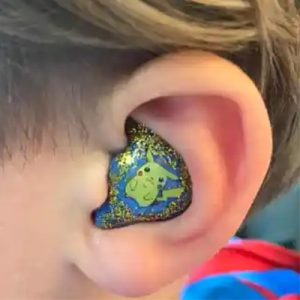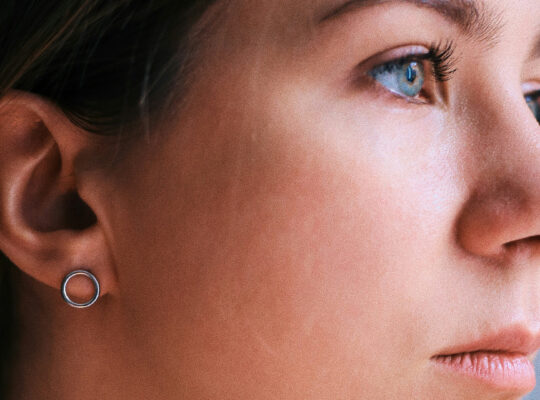We all have ear problems from time to time, but did you know that many ear problems depend on the season? It may sound strange, but your ears react strongly to what is going on around you: pollen in the spring, bathing water in the summer, inclement wind in the fall and cold air in the winter. Each season has its own ear challenges. In this blog, I’ll take you through the four seasons and tell you what you can do to keep your ears healthy – whether it’s hay fever, ear infections or just that pesky itch in your ear canal.
Spring: hay fever and stuffy ears
Spring is known for blooming flowers, singing birds and … sneezing fits. Hay fever can be quite a game-changer. The pollen floating everywhere in the air not only causes watery eyes and a runny nose, but can also affect your ears.
How does that work?
The Eustachian tube – the connection between your nose, throat and ear – can become swollen from hay fever. As a result, fluid doesn’t flow out as well and you may experience an oppressive or full feeling in your ears. Some people even experience temporary hearing loss or tinnitus during a hay fever attack.
What can you do?
- Use nasal sprays or antihistamines (after consulting your doctor).
- Rinse your nose regularly with saline solution to flush away pollen.
- Keep windows closed as much as possible on high pollen days.
- Consider custom-made earmuffs or earplugs if you spend a lot of time outdoors to protect your ears from pungent pollen combined with wind.
Summer: swimming, vacation and ear infections
Summer is the season of the pool, the sea and vacation destinations where water fun takes center stage. But water and ears are not always the best of friends.
Swimmer’s Ear
A common problem in summer is swimmer’s ear: a painful inflammation of the ear canal caused by water left behind in which bacteria feel at home. It often begins with itching or a slight pressing sensation, and can progress to a major ear infection.
Vacation Problems
During air travel in the summer vacations, the following also plays a role barotrauma also plays a role: earache caused by air pressure differences. Children in particular often suffer from this.
What can you do?
- Use custom-made swim caps to prevent water from getting stuck in your ears. These seal perfectly and are ideal for children taking swimming lessons or playing a lot in the pool.
- Dry your ears carefully after swimming.
- Use any special ear drops that help dry the ear.
- Chewing or swallowing gum when taking off and landing on the plane helps relieve pressure.
Autumn: wind, cold and ear problems in outdoor activities
Autumn often brings with it changeable weather: wind gusts, rain showers and falling temperatures. For your ears, that means extra risk of irritation.
Surfer’s Ear
In water sports such as surfing or sailing in the colder months, prolonged exposure to wind and cold water can lead to surfer’s ear: a bony proliferation in the ear canal that interferes with your hearing.
Wind sensitivity
Even if you don’t surf or sail, you may notice in the fall that your ears feel cold more quickly or become sensitive to wind. This can lead to a stinging sensation and sometimes even mild inflammation.
What can you do?
- Wear a headband or hat that properly protects your ears from wind and cold.
- Consider earplugs if you exercise outside a lot in the wind.
- Dry your ears thoroughly after a rain.
Winter: ear infections and colds
Winter is the season of cold, dry air and … runny noses. Colds are not only annoying to your throat and nose, but also often affect your ears.
Middle ear infections
In children, many middle ear infections occur. This, in turn, has to do with the Eustachian tube, which can become blocked with colds. The result: fluid accumulates behind the eardrum, bacteria have free rein, and pain and fever are the result.
Ear pain due to cold air
Some people also get an immediate earache from the cold winter air, especially during outdoor activities such as biking or ice skating.
What can you do?
- Keep ears warm with hats or ear muffs.
- Provide a good indoor climate: not too dry and not too hot.
- When ear infections recur, always consult a doctor, especially in children. Sometimes eardrum tubes are needed to drain fluid.
General tips for healthy ears year-round
- Do not use cotton swabs to clean your ears. That often pushes earwax further in. Rather, opt for a safe alternative such as the Bebird ear cleaner with camera, which allows you to clean your ears in a controlled manner at home.
- Protect your hearing: whether you go to a festival in the summer or to the fair in the fall, always bring earplugs.
- Listen to your body: in case of pain, pressure or hearing loss, it is smart to consult a doctor rather than sit it out.
- Keep your resistance up: healthy diet, adequate sleep and exercise will make your body (and therefore your ears) more resistant to infections.
Summary
Ear problems are often seasonal: from hay fever in spring to ear infections in winter. Each season requires a different way to protect and care for them. The good news is that you can do a lot yourself to keep your ears healthy. Consider using swim caps in the summer, ear muffs in the fall and a warm hat in the winter. And above all, remember that good hygiene and hearing protection are important year-round.
So you can enjoy every season to the fullest – without your ears throwing a spanner in the works.









